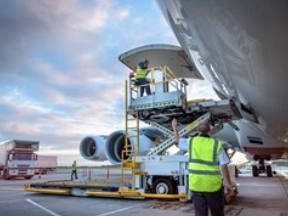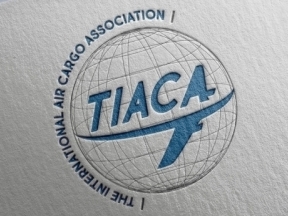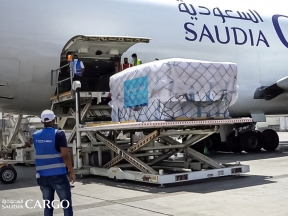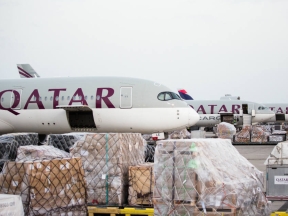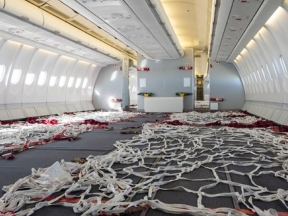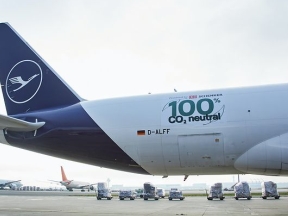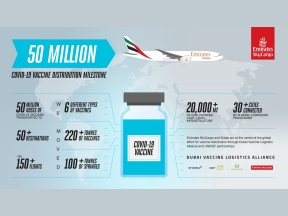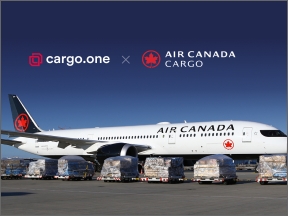The Cargo Agency Conference (CAC) has decided to give freight forwarders a stronger voice in the development of CAC resolutions. This is the result of a newly adopted resolution of the CAC that will require consultation with Regional Joint Councils before any future resolutions (or amendments to resolutions) are proposed to and considered by the CAC. The CAC is composed only of airlines. The Regional Joint Councils are composed of local freight forwarder associations affiliated with the International Federation of Freight Forwarders Associations (FIATA), as well as individual freight forwarders and airlines. Obtaining Regional Joint Council views in advance of adopting resolutions will strengthen the Air Cargo Program by ensuring the efficient global implementation of resolutions. “This is a major improvement for all concerned. The air cargo program works to improve the safety, security, and efficiency of cargo distribution. Considering the views of all interested parties at the beginning of the decision-making process is a win-win. The freight forwarders and their associations will have a stronger voice to influence the process. The CAC will be able to make better decisions with broader input to the decision-making process. And once decisions are made, they can be implemented universally with stronger support from all parties,” said Muhammad Albakri, Senior Vice President for Customer, Financial and Digital Services, IATA. The new streamlined consultation process will help to run the Air Cargo Program more efficiently, reduce costs, and improve and enhance cargo distribution performance throughout the industry. This is particularly crucial during these times of a global pandemic and economic crisis. IATA is the secretariat for the CAC.
Read More »TIACA urges for action plan on challenges faced by the air cargo industry
The International Air Cargo Association (TIACA) has called for action to address five critical challenges being faced by the air cargo industry, which are digitalisation, sustainability, security, liberalisation and collaboration. The organisation has completed a year-long transformation program which has created a forward-looking association well positioned to unite and represent all sectors of the supply chain, reflecting its broad membership composition. “The industry has demonstrated over the last 12 months, how effective it can be when all the supply chain partners unite around a common objective, supporting the global community through the Covid pandemic. Our industry came together initially by transporting PPE and other life essentials and then mobilized to provide the only effective transport mode to support global vaccine distribution” stated Glyn Hughes, Director General, TIACA. TIACA has identified key industry priorities that will need to be embraced by the entire supply chain in order to modernize and continue to provide enhanced solutions addressing shipper and other customer demands. “TIACA is committed to working with its members, the broader industry, association partners and government agencies to ensure we have a united and successful air cargo industry. We have demonstrated considerable success over the past months but as we go forward new challenges will materialize. We will need be more innovative, agile and focused as an industry to overcome them.” states, TIACA, Chair
Read More »Saudia Cargo joins UNICEF’s Humanitarian Airfreight Initiative
With an aim to support the transportation of Covid-19 vaccines alongside essential medicines, medical devices and other critical supplies to fight the pandemic, Saudia Cargo has joined the Humanitarian Airfreight Initiative launched by UNICEF. “Saudia Cargo is ready and on full power to operate for UNICEF Humanitarian Airfreight Initiative and take part in this global vaccines delivery effort through Saudia Cargo’s wide range of destinations and connection points. We fully understand our role and will work hand in hand with UNICEF and ensure the maximum global reach for the vaccines. Safe, timely and efficient transportation of these supplies is paramount and we are sure our air freighters will expertly get the job done,” said Omar Hariri, CEO, Saudia Cargo. “Delivery of these life-saving vaccines is a monumental and complex undertaking, considering the sheer volumes that need to be transported, the cold chain requirements, the number of expected deliveries and the diversity of routes,” said Etleva Kadilli, Director of UNICEF Supply Division. “We are grateful to these airlines for joining forces with the UNICEF Humanitarian Airfreight Initiative to support the roll-out of Covid-19 vaccines.” The members of the initiative are 10 leading airlines which together cover routes to over 100 countries with one goal in mind, to support the COVAX facility – the global effort to ensure equitable access to Covid-19 vaccines regardless of any country’s income level. COVAX facility’s first round distribution plan provides doses to 145 countries starting the first half of 2021. The initiative commits airlines to prioritize the shipment of all life-saving supplies, add freight capacity to routes whenever necessary, and take the important measures of temperature control and security.
Read More »Qatar Airways Cargo moves over 1.5 million doses of vaccine into Qatar
Qatar Airways Cargo has crossed a milestone transport of over 1.5 million COVID19 vaccine doses into the State of Qatar, with its largest batch of more than 530,000 Pfizer and Moderna vaccines arriving on April 4 from Amsterdam. The airline has played a significant role throughout the pandemic and is committed to helping people and giving back to communities, in alignment with its sustainability programme WeQare, based on the core pillars of sustainability – environment, society, economy and culture. Guillaume Halleux, Chief Officer Cargo, said, “We remain committed and resilient in the fight against the pandemic and together with our partners, are ensuring the safe, timely and efficient transportation of these life-saving supplies. I am glad that all our teams have worked so hard to coordinate this milestone transport into the State of Qatar, supporting the country with its COVID19 immunization campaign in the fight against the pandemic.” Since December 2020, Qatar Airways Cargo has transported COVID-19 vaccines to several countries around the world including the State of Qatar, providing large populations access to these vital vaccines, thanks to the dedication and coordinated efforts of its global teams and ground handling partners. Globally, the cargo carrier has surpassed a milestone with close to 20 million COVID-19 vaccines transported into 24 different countries, including COVID-19 vaccines for UNICEF as part of the five-year MoU to support UNICEF’s Humanitarian Airfreight Initiative. Through its QR Pharma product, Qatar Airways Cargo offers controlled cool chain and dedicated monitoring, intervention and servicing as well as proactive re-icing at its Doha hub. With significant investments and enhancments to the QR Pharma product and its state-of-the-art hub in Doha, the cargo carrier confirms its strategy and commitment …
Read More »IATA calls freighters & preighter the agility of airline cargo operations
According to the recently released ‘economics chart of the week’ by IATA, cargo traffic has been proven to be quite resilient serving commerce and industries reliant on the deliveries of critical supplies, since the outbreak of Covid-19 while airline passenger traffic has plummeted. Due to the massive drop of cargo belly hold capacity of passenger operations, overall cargo capacity has become a constraint, and cargo yields have been rising accordingly. In a response to these cargo capacity constraints, a substantial number of airlines have been able to make use of the otherwise spare capacity of passenger aircraft, using them for cargo-only operations, also referred to as ‘preighters’. The majority of preighters have operated with cargo in the belly hold, where the passenger cabin has remained empty, but several airlines even have used the passenger cabin for additional cargo capacity.” While the largest share of cargo traffic is indeed carried by freighters, which traffic has grown significantly albeit constraint due to lack of additional aircraft, one can observe the welcome additional capacity that the preighters have provided.
Read More »DB Schenker and Lufthansa Cargo launch CO2-neutral freight connection from Europe to China
DB Schenker and Lufthansa Cargo launched the first regular carbon neutral cargo flight connection in history. With the take-off of a Boeing 777F, the companies kicked off weekly flights between Frankfurt am Main and Shanghai Pudong, where the fuel requirements are covered entirely by Sustainable Aviation Fuel (SAF). This will save around 174 metric tons of conventional kerosene each week. Jochen Thewes, CEO, DB Schenker, says, “As of now, carbon neutral supply chains are also feasible with airfreight. Our weekly flights between Frankfurt and Shanghai are the kick-off of a new era. We are proud to have already convinced so many customers of this future-orientated product. Next, business and politics have to take charge to create more capacity for regenerative fuels and clean aviation.” Dorothea von Boxberg, CEO, Lufthansa Cargo, adds, “With the world’s first sustainable cargo flight with DB Schenker at the end of 2020, we demonstrated that flying without fossil emissions is already possible. We have jointly launched the world’s first regular sustainable cargo flight connection. This paves the way for many more connections of this kind. We are counting on the determination of our industry and the dedication of consumers to get this off the ground together.” Sustainable Aviation Fuel is produced mainly from biomass waste, such as used vegetable and cooking oils. Thus, when burned in the engine, the same amount of carbon dioxide is released which was previously removed from the atmosphere during the original growth of the plants. In addition, greenhouse gases produced during the manufacture and transport of the fuel are fully offset by sustainable compensation projects. This ensures that flights are completely greenhouse gas neutral. The weekly volume of SAF procured by …
Read More »Emirates SkyCargo delivers 50 million doses of vaccines to more than 50 destinations
Emirates SkyCargo has become the first airline cargo carrier in the world to have transported more than 50 million doses of COVID-19 vaccines on its flights. The carrier has also transported more than 100 tonnes of syringes across the world to support the delivery of vaccines. Since the start of international distribution late last year, Emirates SkyCargo has transported over 220 tonnes of COVID-19 vaccines, equivalent to more than 50 million doses, on more than 150 flights from manufacturing locations to 50 destinations on its network through Dubai. Overall, the carrier has transported six different kinds of COVD-19 vaccines. Nabil Sultan, Emirates Divisional Senior Vice President, Cargo, said, “As a socially responsible global air cargo carrier, our actions over the last year have always been directed at helping communities across the world, and especially those in developing nations, recover from the devastating impact of the pandemic. We have been leading the global air cargo industry’s efforts and working with our partner organisations in Dubai to rapidly distribute COVID-19 vaccines through Dubai to the rest of the world.” Emirates SkyCargo has remained agile and dynamic throughout the COVID-19 pandemic, responding quickly to maintain international connectivity for essential goods across the world. The carrier was one of the first in the world to deploy passenger aircraft for cargo only flights in order to transport PPE, medical equipment, pharmaceuticals and food. Over one year, Emirates SkyCargo had operated more than 27,800 flights and transported over 100,000 tonnes of essential commodities.
Read More »Air Canada Cargo signs Letter of Intent with cargo.one, enabling forwarders to easy booking experience
cargo.one has entered into a letter of intent with Air Canada, through its cargo division Air Canada Cargo, to offer its capacity on cargo.one’s leading air cargo booking platform. Upon conclusion of a definitive agreement, freight forwarders will soon have access to a first-class booking experience with real-time capacity and quotes. The airline is poised to become the first North American airline on the cargo.one ebooking platform. “We are delighted to double down on our global expansion strategy and look forward to welcoming Air Canada Cargo on board as a first mover in the North American region. Air Canada Cargo’s constant drive for innovation and technology to offer customers the best possible service is very much in line with cargo.one’s values and strategy,” stated Moritz Claussen, Co-Founder and Managing Director, cargo.one. “Given the current capacity constraints out of Europe to North America, cargo.one’s growing user base will now have additional real-time access to much sought-after space at the click of a button.“ Jason Berry, Vice President Cargo at Air Canada, said, “An association with cargo.one will enable us to deliver on our customer promise of providing easy and reliable booking access to our growing capacities and help us to further develop our digital distribution capabilities. A concluded definitive agreement will support Air Canada Cargo’s rapid cargo network expansion, increase its day-to-day efficiency, while at the same time offering customers an outstanding service quality and seamless online access to attractive connections to and from Europe, Latin America, the US and Asia-Pacific.” cargo.one and Air Canada Cargo have kicked off their integration phase. Subject to the conclusion of a definitive agreement which is planned to be finalised by April 30, Europe to …
Read More »E-commerce & global logistics provides the key to unlock local shutdowns: DHL Express
In its new Whitepaper, ‘The Ultimate B2B E-commerce Guide: Tradition is out. Digital is in’, DHL Expres predicts strong growth for the B2B e commerce market in the coming years. 80 per cent of all B2B sales interactions between suppliers and professional buyers will take place in digital channels by 2025. The impact of the Covid-19 pandemic on the pace of digitalisation and the purchasing behaviour of technology-savvy millennials, who are now of an age to be the professional B2B decision-makers, are the main drivers of this global e-commerce growth. What is predicted for the future of the B2B sector, has already been visible in the significant B2C e-commerce rise over the last years, where DHL Express experienced high growth rates particularly during the holiday peak seasons (e.g. Easter, Christmas) and mega shopping days (e. g. Black Friday, Cyber Monday). In total the B2C E commerce volumes within the DHL Express network increased in 2020 by approximately 40 per cent, compared to 2019. This positive business development is also reflected in the FY2020 financial results of the company: With a total revenue of €19.1 billion (+11.9 per cent year-on-year) and EBIT of €2.7 billion (+34.9 per cent) the Express division of Deutsche Post DHL Group closed 2020 with the best result in its more than 50 years history. “Even in times of worldwide shutdowns, globalisation has shown its resilience, fuelled by digitalisation and the power of global trade”, says John Pearson, CEO of DHL Express. “These trends have led to an ever growing number of consumers to shift their shopping activities online. The pandemic has accelerated this development like never before, with a sharp rise in businesses selling their goods …
Read More »Pharma.Aero & HLA sign MoU to handle last-mile delivery of pharmaceuticals during crisis situation
Recognising the importance of developing air cargo supply chains to handle and transport pharmaceuticals, especially for the last-mile delivery, in humanitarian contexts or in crisis situations, Pharma.Aero and Humanitarian Logistics Association (HLA) have signed a Memorandum of Understanding (MoU). This collaboration will not only underline common interests between the two organisations, but also enable both organisations to combine forces in strategic projects that will improve quality in global air cargo industry, with a focus on crisis-prone countries, as well as emergencies and humanitarian projects. Jeremy Mitchell, Director, Pharma.Aero stresses the importance of this new collaboration, “By joining forces with HLA, we bring the human interest aspect into the Pharma.Aero network and platform. This will create more leverage and added value in all our undertakings as well as broaden our scope and impact when reaching out to the entire pharmaceutical air cargo supply chain.” “HLA aims to increase understanding and forge alliances between aid organisations, the private, public and academic sectors” adds George Fenton, Chief Executive, HLA, “The newly formed partnership with Pharma.Aero will enable us to add significant value to our network and gear up the effectiveness and efficiency of members by raising awareness of standards, facilitating access to training and career development opportunities, and encourage collaboration among a broader range of humanitarian logisticians.” Trevor Caswell, Vice Chairman Pharma.Aero and responsible for Projects, points out that “Both organisations share the same vision; being a neutral platform of international best-practice and knowledge sharing, and fostering community collaboration by trust. In setting up joint projects that emphasize the growing importance – both for the rapidly changing aid system as well as for the supply chain – of ‘local actors’ and ‘last mile’, …
Read More » Cargo Breaking News
Cargo Breaking News
